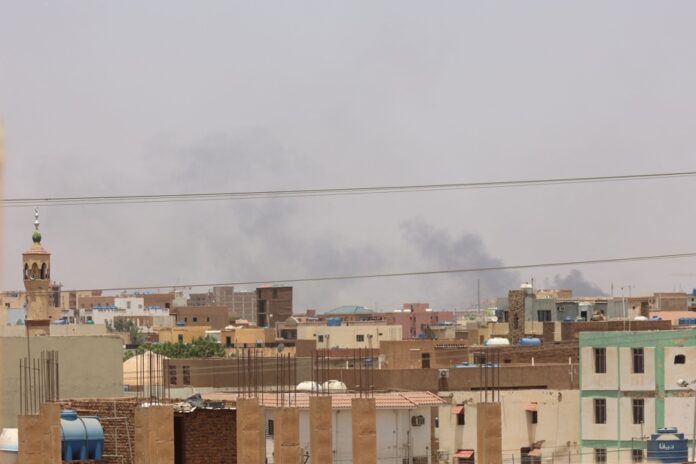(Khartoum) A hundred civilians were killed in Sudan where gunfire and explosions increased in intensity on Monday in Khartoum, on the third day of fighting between the army and a powerful paramilitary force, led by two rival generals who are vying for power.
Since Saturday, the capital from which rise columns of thick black smoke has been bathed in the smell of gunpowder. Its inhabitants are barricaded in their homes without running water or electricity for the most part, trembling with each new airstrike or artillery fire.
97 civilians were killed, about half in Khartoum, according to the official doctors’ union, and “dozens” of combatants died. The two sides have never communicated on their losses.
In Khartoum, where only men in fatigues and military vehicles circulate, the few grocery stores open have warned that they will only last a few days if no truck arrives. The hospitals that receive the wounded have no more blood or equipment.
After the Arab League and the African Union, the United States and the United Kingdom called on Monday for the “immediate cessation” of the violence.
The conflict had been latent for weeks between the head of the army, General Abdel Fattah al-Burhane, de facto leader of the country, and his number two, General Mohamed Hamdane Daglo, known as “ Hemedti”, at the head of the Forces rapid support (FSR), who together ousted civilians from power during the October 2021 putsch.
Since Saturday, the fighting with heavy weapons has not ceased and the air force regularly targets, even in the middle of Khartoum, the headquarters of the FSR, former militiamen of the war in the Darfur region who have become official army auxiliaries.
The army assured Sunday evening that the situation was “extremely stable” while the FSR said they were “on the way to winning definitively”.
In fact, it was impossible on Monday to know which force controls what. The FSR announced that they had taken the airport and entered the presidential palace, which the army denied.
The army especially claims to hold the HQ of its staff, one of the main power complexes in Khartoum.
As for state television, the two parties also claim to have taken it. But the inhabitants of the surroundings report continuous fighting while on the air, only patriotic songs are broadcast, as during the putsch.
While no truce is emerging, doctors and humanitarians are sounding the alarm: already in normal times, in Sudan, homes are only supplied with electricity for a few hours a day. In some neighborhoods of Khartoum, it has been completely cut off since Saturday, like running water.
Doctors have announced power cuts in operating rooms. According to the World Health Organization (WHO), “several of the nine hospitals in Khartoum receiving wounded civilians have run out of blood, transfusion equipment, intravenous fluids and other vital materials”.
Patients, sometimes children, and their loved ones “ have no more food or drink”, said a network of pro-democracy doctors, saying that they can no longer let treated patients leave safely, which creates “ a bottleneck that prevents you from taking care of everyone”.
The three-hour “humanitarian corridors” announced on Sunday afternoon by the two belligerents did not change the situation: during all this time, explosions and shootings did not stop in Khartoum.
The UN, which had proposed this humanitarian truce, said it was “extremely disappointed” by these violations, denouncing “an intensification of the fighting” on Monday morning.
With more than a third of Sudan’s 45 million people in need of humanitarian aid before the recent outbreak of violence, the World Food Program (WFP) on Sunday suspended aid after three of its staff were killed in fighting in Darfur (west).
“ It is the first time in the history of Sudan since independence (in 1956) that there is such a level of violence in the center, in Khartoum ”, assures AFP Kholood Khair, who founded the Confluence Advisory research center in Khartoum.
Khartoum “has always been the safest place in Sudan, during the murderous wars against rebels” launched in Darfur and elsewhere in the 2000s, she continues.
“Today, the fighting is taking place all over the city, the FSR are established everywhere and especially in densely populated areas, because the belligerents believed that the possibility of a high civilian toll would deter the other side: now we knows that their power struggle at all costs has won,” adds Ms. Khair.


















